Hepatitis B And The Prevention Of Primary Cancer Of The Liver(English, Hardcover, unknown)
Quick Overview
Product Price Comparison
This important book comprises a narrative account of research on the hepatitis B virus (and related subjects) and selected reprints from the laboratory of Nobel laureate Baruch S Blumberg and his colleagues. The hepatitis B virus (HBV) is one of the ten most common deadly infectious diseases and is responsible for 1.1 million deaths a year worldwide.Research in his laboratory resulted in the discovery of HBV and the invention of the vaccine which protects one against it. The research began as an apparently esoteric study of human biochemical and immunologic variation. This required field-work in Africa, the Arctic, the Pacific, the Americas, and in many other locations and populations. The overall goal was to identify inherited biological differences which were related to differing responses to disease-causing agents. The virus was discovered using the blood of an infected person who had developed the antibody, to detect the virus present in another infected person who had become a carrier of the virus. Screening of blood donors led to the near-elimination of post-transfusion hepatitis B.There are now national HBV vaccination programs in more than 70 countries. During the past decade these programs have strikingly reduced the prevalence of HBV in many countries and there has been a significant drop in the incidence of cancer of the liver in the vaccinated cohorts. The HBV vaccination program is now, after smoking cessation, the most widely used cancer prevention program in the world.


